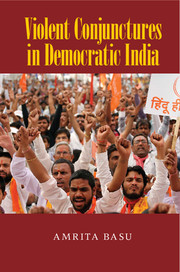Book contents
- Frontmatter
- Dedication
- Contents
- List of Figures and Tables
- Acknowledgments
- Glossary of Indian Words and Terms
- Indian Organizations, Institutions, and Political Parties
- Abbreviations of Political Parties and Organizations
- Introduction
- PART I THE PILLARS OF HINDU NATIONALISM
- 1 The State: Dialectics of States, Parties, and Movements
- 2 Party Politics: Disrupting Party-Movement Boundaries
- 3 Movement Politics: Globalized Markets and Sacred Spaces
- PART II EXTENSIVE VIOLENCE
- PART III EPISODIC VIOLENCE
- Selected Bibliography
- Index
- Books in the Series (continued from page iii)
1 - The State: Dialectics of States, Parties, and Movements
from PART I - THE PILLARS OF HINDU NATIONALISM
Published online by Cambridge University Press: 05 July 2015
- Frontmatter
- Dedication
- Contents
- List of Figures and Tables
- Acknowledgments
- Glossary of Indian Words and Terms
- Indian Organizations, Institutions, and Political Parties
- Abbreviations of Political Parties and Organizations
- Introduction
- PART I THE PILLARS OF HINDU NATIONALISM
- 1 The State: Dialectics of States, Parties, and Movements
- 2 Party Politics: Disrupting Party-Movement Boundaries
- 3 Movement Politics: Globalized Markets and Sacred Spaces
- PART II EXTENSIVE VIOLENCE
- PART III EPISODIC VIOLENCE
- Selected Bibliography
- Index
- Books in the Series (continued from page iii)
Summary
Social movements' appeals, demands, and objectives reveal the state's authoritative power. Even when movements oppose, reject, or claim indifference to the state, they seek access to state resources and allies in the courts and bureaucracy. Craig Jenkins and Bert Klandermans aptly suggest:
As the institutionalized center for the legitimate monopoly on the means of violence, the state is the ultimate arbiter for the allocation of socially valued goods. … The state is simultaneously target, sponsor and antagonist for social movements as well as the organizer of the political system and the arbiter of victory.
“Collective identities are not simply given but must be validated and recognized,” argue Doug McAdam, Sidney Tarrow, and Charles Tilly, and “states are the most symbolically powerful agencies for conferring recognition.” The Indian Constitution defines identities and prescribes how they should be treated. Its affirmation of federal principles and cultural pluralism has inspired ethnic minority struggles for the devolution of power and the creation of linguistic states. Its provision of reserved quotas, a form of compensatory discrimination, has encouraged the emergence of low-caste movements and parties. By identifying Muslims as a religious rather than a socioeconomic community, the Constitution has encouraged Muslims to organize around cultural and religious issues rather than for economic and political advancement.
The state sets an agenda to which opposition parties and movements respond. Accordingly, changes in the structure and policies of the postindependence Indian state are associated with changing modes of protest. Raka Ray and Mary Katzenstein argue that state policies during three distinct periods – the social democratic (1947–66), populist (1967–88), and religious nationalist and market-oriented (1989 to the present) – influenced the character of political opposition. During the last period, religious nationalist movements were much stronger under the NDA than under United Progressive Alliance (UPA) governments.
This chapter explores the reciprocal influences of social movements and political parties on the state and of state policies on movements and parties. Its focus is on a few significant dimensions of state influence. The first is the extent to which the state shapes, heightens, and mobilizes identities. The more the state acknowledges and appeals to identity groups, the more it strengthens identity-based movements and parties. Second, state factionalism encourages the emergence of social movements. During the era of single-party dominance, social movements were most likely to emerge when the ruling party and the state were factionalized.
- Type
- Chapter
- Information
- Violent Conjunctures in Democratic India , pp. 27 - 51Publisher: Cambridge University PressPrint publication year: 2015



